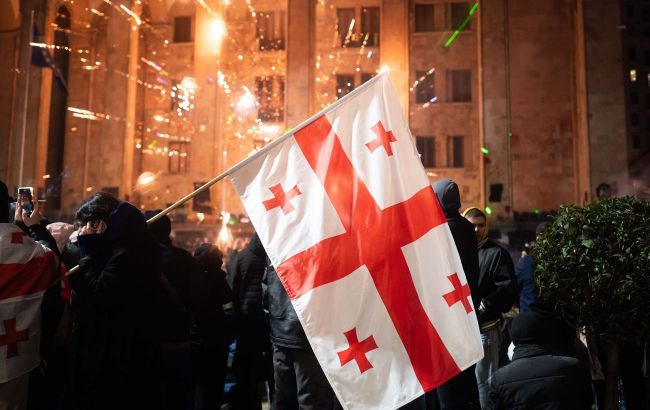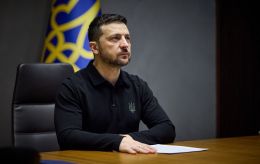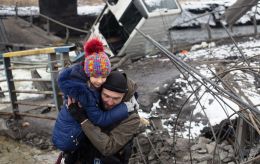Protests continue for the sixth day in Tbilisi: Water cannons and gas, arrests and dispersals
 Mass protests continue in the center of the Georgian capital (photo: x.com_jswhitley)
Mass protests continue in the center of the Georgian capital (photo: x.com_jswhitley)
In the center of Tbilisi, another night of mass protests has begun due to the government's delay in negotiations regarding Georgia's accession to the European Union. Police special forces are harshly detaining participants of the rally, reports Newsgeorgia.
People began gathering at Freedom Square near the parliament in the evening on December 3. At the beginning of the rally, participants warmed up by burning T-shirts with the Georgian Dream symbols.
Closer to midnight local time (22:00 Kyiv time), the special forces began another nighttime dispersal.
A water cannon was activated on a side street leading to Rustaveli Avenue. At the same time, special forces started moving from Freedom Square.
Mass arrests began on central Shota Rustaveli Avenue. The Ministry of Internal Affairs stated that a total of 300 people had been detained over the past few days.
Special forces, with the cover of water cannons, began pushing protesters off the area in front of the parliament.
A group with firecrackers remained in front of the security forces, which allowed the main part of the protest to move deeper into Rustaveli Avenue.
However, the special forces still actively used tear gas.
After 1:00 AM local time (23:00 Kyiv time), the special forces ceased active actions against the demonstrators.
Most of the participants are located from the Rustaveli Theatre to Republic Square, with only a few dozen remaining at the frontline.
Around 2:00 a.m. local time (00:00 Kyiv time), protesters on Rustaveli Avenue organized an impromptu laser and light show.
Updated at 1:00 a.m.
In Tbilisi, it's the third hour of the night. The standoff between protesters and special forces continues somewhere in the middle of Rustaveli Avenue.
Many people, lacking gas masks and other protective equipment, are still standing further back.
The special forces usually begin a full sweep of Rustaveli Avenue between 4:00 and 6:00 a.m.
Updated
As of 3:30 a.m. Tbilisi time (1:30 a.m. Kyiv time), special forces have begun encircling the protesters.
The main line of special forces moved from Freedom Square, while buses with riot police and water cannons approached from the direction of Republic Square.
Simultaneously, security forces blocked off the upper streets leading from Rustaveli Avenue. Protesters were being trapped from all sides.
By 4:00 a.m., the Ministry of Internal Affairs forces have taken control of Rustaveli Avenue in Tbilisi. People are being detained near Republic Square.
The majority of the protesters have moved toward the Rustaveli metro station. Gas is being deployed along the avenue, and with no wind, it lingers in the air for a long time.
Criminal police have been spotted on all adjacent streets, typically mopping up – and detaining anyone they can catch after the dispersal.
Drivers are allowing protesters to pass as they head toward the Rustaveli metro station and further toward the Philharmonic, honking in support.
A moment when a truck driver stops the special forces at the waterfront, blocking the road.
Some of the protesters are moving down Kostava Street from the Philharmonic toward Heroes Square. Another large group has gathered at the waterfront near the Dry Bridge. Both columns will likely merge.
There are also some people on Melikishvili Street, on their way to the university. They quickly built barricades from trash bins and set them on fire.
Updated at 5:50 a.m.
The night of protests in Tbilisi came to an end early in the morning, around 7:00 a.m.
The most determined groups of protesters, after several dispersals, reached Vazha-Pshavela Avenue, where they marched. Vehicles on the avenue slowed down to match the pace as those marching sang the national anthem.
Protests in Georgia
In the parliamentary elections held in Georgia on October 26, marked by widespread violations, the pro-Russian party Georgian Dream, led by Irakli Kobakhidze, emerged victorious with 54% of the vote.
President Salome Zourabichvili and opposition parties, which gained between 8% and 11%, refused to recognize the election results, declared the newly elected parliament illegitimate, and called on people to protest.
Initially, the protests were small-scale and did not escalate into clashes with security forces. However, the situation sharply deteriorated on November 28 when the government formed from the new parliament, led by Prime Minister Kobakhidze, postponed the start of negotiations for the country’s EU membership until 2028.
Opposition leaders, parties, and ordinary Georgians have begun large-scale protests in central Tbilisi, demanding the reversal of the government's decision.
The protests have been ongoing for the sixth day in the heart of the Georgian capital, as well as in Batumi, Kobuleti, Ozurgeti, and other cities across the country. In Tbilisi, every night, special forces aggressively disperse the crowds using water cannons and tear gas and detain protesters.
Due to the violent suppression of protests, the US has suspended its strategic partnership with Georgia and imposed sanctions, as well as visa restrictions on several Georgian officials.
Several Baltic countries have also imposed sanctions on Georgian officials.
For insights on the likelihood of Georgian protests escalating into a revolution, read the article by RBC-Ukraine.

